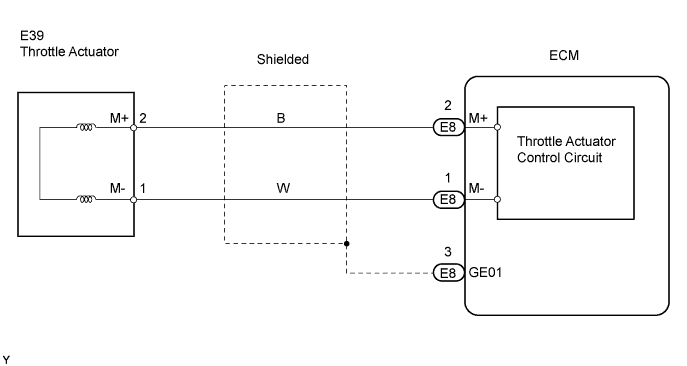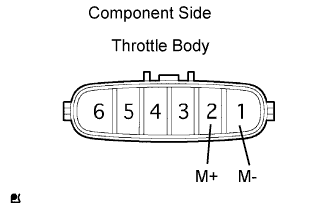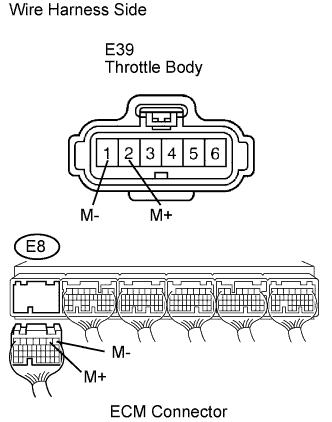Dtc P2102 Throttle Actuator Control Motor Circuit Low
Engine. Lexus Gs430, Gs300. Uzs190 Grs190
SYSTEM DESCRIPTION
MONITOR DESCRIPTION
FAIL-SAFE
WIRING DIAGRAM
INSPECTION PROCEDURE
INSPECT THROTTLE BODY (RESISTANCE OF THROTTLE CONTROL MOTOR)
CHECK HARNESS AND CONNECTOR (THROTTLE CONTROL MOTOR - ECM)
INSPECT THROTTLE BODY
INSPECT THROTTLE VALVE
DTC P2102 Throttle Actuator Control Motor Circuit Low |
DTC P2103 Throttle Actuator Control Motor Circuit High |
SYSTEM DESCRIPTION
The throttle actuator is operated by the ECM and opens and closes the throttle valve using gears.The opening angle of the throttle valve is detected by the Throttle Position (TP) sensor, which is mounted on the throttle body. The TP sensor provides feedback to the ECM. This feedback allows the ECM to appropriately control the throttle actuator and monitor the throttle opening angle as the ECM responds to driver inputs. - HINT:
- This ETCS (Electronic Throttle Control System) does not use a throttle cable.
DTC No.
| DTC Detection Condition
| Trouble Area
|
P2102
| Conditions (a) and (b) continue for 2.0 seconds (1 trip detection logic):
(a) Throttle actuator duty ratio 80 % or more
(b) Throttle actuator current 0.5 A or less
| - Open in throttle actuator circuit
- Throttle actuator
- ECM
|
P2103
| Either of following conditions met:
- Hybrid IC diagnosis signal fail
- Hybrid IC current limiter port fail
| - Short in throttle actuator circuit
- Throttle actuator
- Throttle valve
- Throttle body assembly
- ECM
|
MONITOR DESCRIPTION
The ECM monitors the electrical current through the electronic actuator, and detects malfunctions and open circuits in the throttle actuator based on this value. If the current is outside the standard range, the ECM determines that there is a malfunction in the throttle actuator. In addition, if the throttle valve does not function properly (for example, stuck on), the ECM determines that there is a malfunction. The ECM then illuminates the MIL and sets a DTC. Example:When the electrical current is more than 10 A, or less than 0.5 A and the throttle actuator duty ratio exceeds 80 %, the ECM interprets this as the current being outside the standard range, and illuminates the MIL and sets a DTC. If the malfunction is not repaired successfully, a DTC is set when the engine is quickly revved to a high rpm several times after the engine has idled for 5 seconds after engine start.
FAIL-SAFE
When either of these DTCs, as well as other DTCs relating to ETCS (Electronic Throttle Control System) malfunctions, is set, the ECM enters fail-safe mode. During fail-safe mode, the ECM cuts the current to the throttle actuator off, and the throttle valve is returned to a 6° throttle angle by the return spring. The ECM then adjusts the engine output by controlling the fuel injection (intermittent fuel-cut) and ignition timing, in accordance with the accelerator pedal opening angle, to allow the vehicle to continue at a minimal speed. If the accelerator pedal is depressed firmly and gently, the vehicle can be driven slowly.Fail-safe mode continues until a pass condition is detected, and the engine switch is then turned off.
WIRING DIAGRAM
INSPECTION PROCEDURE
- HINT:
- Read freeze frame data using an intelligent tester. Freeze frame data records the engine conditions when malfunctions are detected. When troubleshooting, freeze frame data can help determine if the vehicle was moving or stationary, if the engine was warmed up or not, if the air-fuel ratio was lean or rich, and other data from the time the malfunction occurred.
- The throttle actuator current (Throttle Motor Current) and the throttle actuator duty ratio (Throttle Motor Open Duty / Throttle Motor Close Duty) can be read using the intelligent tester. However the ECM shuts off the throttle actuator current when the ETCS malfunctions.
| 1.INSPECT THROTTLE BODY (RESISTANCE OF THROTTLE CONTROL MOTOR) |
Disconnect the E39 throttle body connector.
Measure the resistance between the terminals of the throttle control motor.
- Standard resistance:
Tester Connection
| Specified Condition
|
M+ (E39-2) - M- (E39-1)
| 0.3 to 100 Ω
at 20°C (68°F)
|
Reconnect the throttle body connector.
| 2.CHECK HARNESS AND CONNECTOR (THROTTLE CONTROL MOTOR - ECM) |
Disconnect the E39 throttle body connector.
Disconnect the E8 ECM connector.
Measure the resistance.
- Standard resistance (Check for open):
Tester Connection
| Specified Condition
|
M+ (E39-2) - M+ (E8-2)
| Below 1 Ω
|
M- (E39-1) - M- (E8-1)
| Below 1 Ω
|
- Standard resistance (Check for short):
Tester Connection
| Specified Condition
|
M+ (E39-2) or M+ (E8-2) - Body ground
| 10 kΩ or higher
|
M- (E39-1) or M- (E8-1) - Body ground
| 10 kΩ or higher
|
Reconnect the throttle body connector.
Reconnect the ECM connector.
| | REPAIR OR REPLACE HARNESS AND CONNECTOR |
|
|
Check for foreign objects between the throttle valve and the housing.
| | REMOVE FOREIGN OBJECT AND CLEAN THROTTLE BODY |
|
|
Check if the throttle valve opens and closes smoothly.


